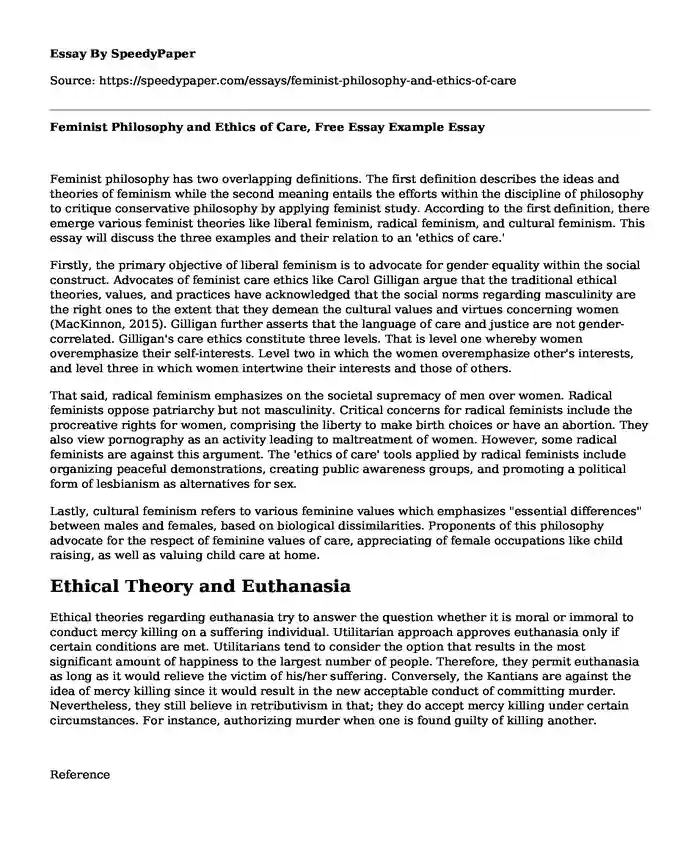Feminist philosophy has two overlapping definitions. The first definition describes the ideas and theories of feminism while the second meaning entails the efforts within the discipline of philosophy to critique conservative philosophy by applying feminist study. According to the first definition, there emerge various feminist theories like liberal feminism, radical feminism, and cultural feminism. This essay will discuss the three examples and their relation to an 'ethics of care.'
Firstly, the primary objective of liberal feminism is to advocate for gender equality within the social construct. Advocates of feminist care ethics like Carol Gilligan argue that the traditional ethical theories, values, and practices have acknowledged that the social norms regarding masculinity are the right ones to the extent that they demean the cultural values and virtues concerning women (MacKinnon, 2015). Gilligan further asserts that the language of care and justice are not gender-correlated. Gilligan's care ethics constitute three levels. That is level one whereby women overemphasize their self-interests. Level two in which the women overemphasize other's interests, and level three in which women intertwine their interests and those of others.
That said, radical feminism emphasizes on the societal supremacy of men over women. Radical feminists oppose patriarchy but not masculinity. Critical concerns for radical feminists include the procreative rights for women, comprising the liberty to make birth choices or have an abortion. They also view pornography as an activity leading to maltreatment of women. However, some radical feminists are against this argument. The 'ethics of care' tools applied by radical feminists include organizing peaceful demonstrations, creating public awareness groups, and promoting a political form of lesbianism as alternatives for sex.
Lastly, cultural feminism refers to various feminine values which emphasizes "essential differences" between males and females, based on biological dissimilarities. Proponents of this philosophy advocate for the respect of feminine values of care, appreciating of female occupations like child raising, as well as valuing child care at home.
Ethical Theory and Euthanasia
Ethical theories regarding euthanasia try to answer the question whether it is moral or immoral to conduct mercy killing on a suffering individual. Utilitarian approach approves euthanasia only if certain conditions are met. Utilitarians tend to consider the option that results in the most significant amount of happiness to the largest number of people. Therefore, they permit euthanasia as long as it would relieve the victim of his/her suffering. Conversely, the Kantians are against the idea of mercy killing since it would result in the new acceptable conduct of committing murder. Nevertheless, they still believe in retributivism in that; they do accept mercy killing under certain circumstances. For instance, authorizing murder when one is found guilty of killing another.
Reference
MacKinnon, B. (2015). Ethics: Theory and contemporary issues (concise). Cengage, Edition 8.
Cite this page
Feminist Philosophy and Ethics of Care, Free Essay Example. (2022, Apr 28). Retrieved from https://speedypaper.net/essays/feminist-philosophy-and-ethics-of-care
Request Removal
If you are the original author of this essay and no longer wish to have it published on the SpeedyPaper website, please click below to request its removal:
- Free Essay on Healthcare Reform: Management Action Plan
- Me and My Environment, Essay Sample
- Ockham Technologies Case Study. Free Essay.
- Book Review Essay Sample on My Sister's Keeper
- Sleep Cycle Response - Free Essay in Psychology
- Article Review Essay: Stereotypes and Self-Perceptions of Physical Education Pre-Service Teachers
- Free Essay. Definitions of deviant behavior
Popular categories





